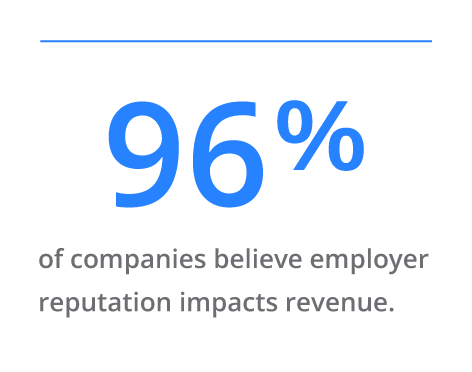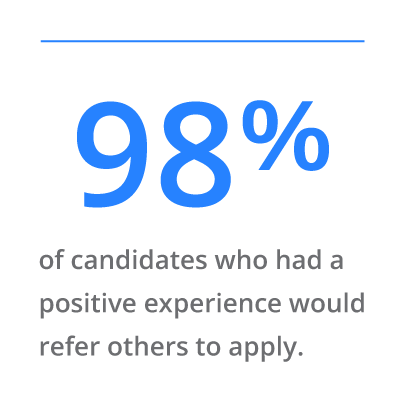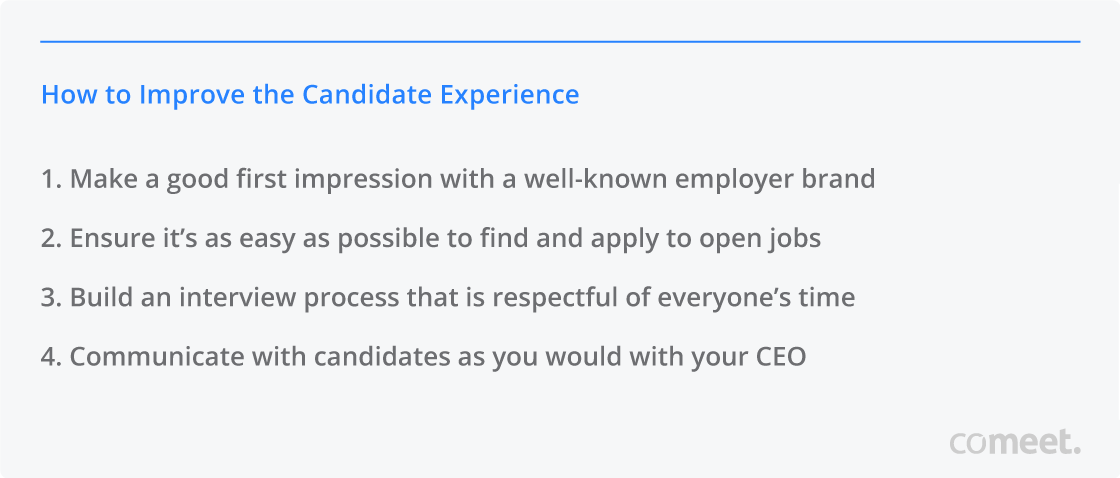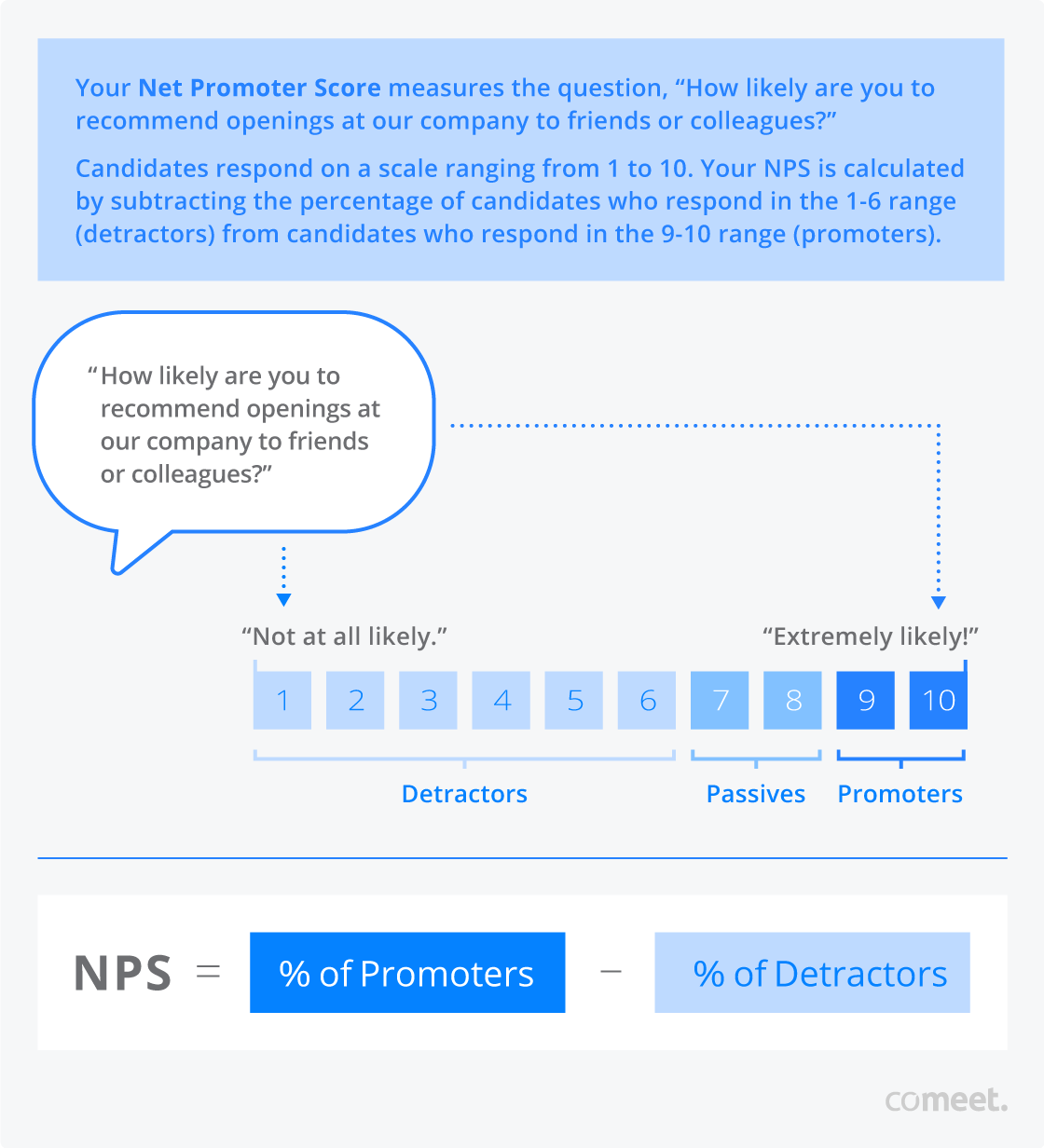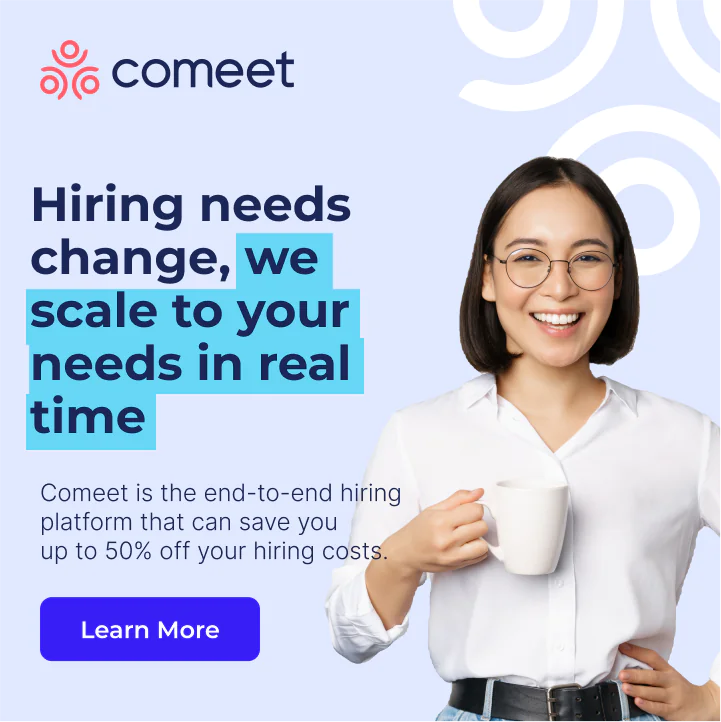Recruitment is becoming more like marketing — more than 80 percent of HR professionals say.
This is because the reputation of an employer has become more important than ever. Job seekers turn to Glassdoor to learn the experiences of others as they believe a company should have positive values. They trust the word-of-mouth feedback about employers that spreads with ease across social media and chats.
More than ever, the onus is now on the hiring company to market itself to the job seeker. So, how do you build a reputation as a good employer?
In large part, by improving the candidate experience. A positive candidate experience differentiates your company and its reputation as an employer, regardless of whether you hire that candidate.
Psst… our guide takes a deep dive into improving and measuring candidate experience. Download it here.
What is the Candidate Experience?
Candidate experience describes the ways in which job seekers perceive their interactions with your company as they go through the hiring process. Each point of a candidate’s journey influences their experience, from:
- First becoming aware of the employer
- Learning about the employer’s company, brand, customers, and team
- Finding an open job that matches the candidate’s qualifications
- Applying to that open job
- Interviewing with recruiters, HR leaders, hiring managers, and/or prospective peers
- Communicating with team members from the hiring company
- Learning of the final hiring decision
Why Should My Company Focus on the Candidate Experience?
Hiring is a two-way street. A candidate’s experience with your company is as important as the alternative: your company’s experience with the candidate.
Every person — even those your company doesn’t hire — walks away from their candidate journey with a formed perception of your business. Considering that every corporate job opening attracts 250 resumes, four-to-six interviews, and one offer — that’s a lot of people with the potential to spread positive sentiment about your brand.
That perception has power. Half of job candidates would not take a job from a company with a bad reputation, even for a pay increase.
Need more convincing? Here are a few ways your company benefits from a positive candidate experience.
More (and better) Glassdoor reviews on the interview process
This is huge, considering that more than half of job seekers look for information about a company on job search websites like Glassdoor. Chances are, candidates are looking at the reviews of your interviewing process too.
Take Google, for example. The company is one of Glassdoor’s employee choice top places to work. It has 11,000 Glassdoor reviews about its interview process and 12,000 reviews about working there.
Positive word of mouth
After job search websites like Glassdoor, word of mouth is the second most popular information source about an employer. People that had a positive candidate experience will remember your brand and speak positively about it.
Added bonus: About half of candidates with a positive experience would share it with their social networks too.
 Improved perception of your brand on the whole
Improved perception of your brand on the whole
If people trust your employer brand, they’ll likely believe in your company’s brand too. In fact, 96 percent of companies believe that employer reputation positively or negatively impacts revenue.
This belief pays off. Companies with a renowned employer brand — think Basecamp, Buffer, and Lyft — also enjoy increased trust in their offering and expertise.
Stronger talent pool
Candidates are more likely to re-apply if they had a positive candidate experience the first time. Only 2% of candidates with a positive experience would not apply again; 81% of candidates with a negative experience would not.
Plus, 98% of candidates who had a positive experience would refer others to apply.
This only has positive implications on your company’s talent pool. The best part of all this: It’s in your power to ensure that a candidate’s perception is a positive one. Do so, and you’ll strengthen your company’s brand, your reputation as a good employer, and the strength of your future hires.
How to Improve the Candidate Experience
Your company has an opportunity to improve the candidate experience at every step of the hiring journey. These recommendations are just the starting point. Put them in place and you’ll set a solid foundation for creating positive candidate experiences.
Make a Good First Impression with a Well-known Employer Brand
When scanning for open roles, job seekers are drawn to companies with a reputation as a good employer. They may look to any or all of the below platforms to learn more about your employer brand:
- Word of mouth, and what their friends, colleagues, or peers know about your company.
- Glassdoor reviews, and what others thought of working or interviewing at your company.
- Press that your company has earned, and the positive nature of that press.
- The values your company abides by — ideally, your Careers Page outlines your values.
- Employer awards that your company may have won or been short-listed for. If your company earns any such accolades, they should post them on your Careers Page.
Invest in building out an employer brand that is positive and trusted, and you’ll see each of these platforms flesh out over time.
Ensure It’s As Easy As Possible to Find and Apply to Open Jobs
To start, your Careers Page should be visible and easily accessible on your website — you should be able to navigate there from your homepage. List open roles by team, such as marketing, sales, and engineering. That way, candidates can hone in on open roles that they’re a fit for.
When drafting and publishing a job description on your website, put yourself in the candidate’s shoes. Ask yourself these questions:
- Have we introduced our company and our mission?
- Are the job responsibilities up-to-date and in line with what the hiring manager wants?
- Do the job responsibilities differentiate between requirements and nice-to-haves?
- Is our careers page easy to find?
- Are the application instructions outlined in detail?
- Is our application process technologically flexible? Could someone apply on their smartphone?
- Do we streamline the application process wherever possible, such as through a LinkedIn integration?
Finally, try to post your job description across as many channels as possible. Besides publishing it on your website’s Career Page, consider posting it on LinkedIn, other job board sites, and in local communities such as a Marketing Meetup.
Build an Interview Process That Is Respectful of Everyone’s Time
Interviewing is a time-consuming and exhausting experience. Respect the candidate’s time by making the interview experience as smooth as possible.
To start, try to move through the interview process quickly. Reach out to candidates a few days or, at most, a few weeks after they’ve applied.
Don’t ask for too much upfront. For example, don’t ask a candidate for a lengthy test or assignment after the 15-minute HR screening test.
Most importantly, let candidates know what to expect. All too often, candidates show up for interviews with little-to-no idea of what their interviews will look like. Tell candidates as many details as possible, so they can prepare accordingly:
- The number of people they’ll interview with
- The names and titles of the people they’ll interview with
- How long they can expect to be at your office
- Dress code expectations and what they should bring (extra resumes, for example)
- What your interviews will focus on. For example, will you be interviewing for cultural fit? Technical skills?
Communicate with Candidates As You Would with Your CEO
Communication is one of the easiest, most impactful ways to improve the candidate experience. Approach communication with each candidate as you would with your company’s CEO — be direct, transparent, and respectful of their time.
Here are some simple ways to communicate with candidates for a positive experience.
- Be flexible in your methods of communication. Phone calls and emails are used most often. But experiment with text messages and chat systems to boost convenience for everyone involved.
- Share your side of things. Share your company’s reasoning behind each step of the process. If you’d like to bring a candidate in for in-person interviews, for example, explain what your team is hoping to gain from the experience.
- Be upfront with the details. Provide as much information on the process as possible, so the candidate always knows where they stand. If you’ve decided not to move forward with a candidate, for example, tell them!
You Can’t Improve Candidate Experience If You’re Not Measuring It
By this point, you’ve likely taken steps to improve your internal hiring processes. You’ve also likely onboarded new technology to improve the candidate experience. Now, how do you make sure these efforts have the right impact for your candidates and your team?
The answer is to measure, measure, measure. Without setting clear KPIs and benchmarking your candidate experience, any hiring changes you make will feel like shooting in the dark.
We believe that measuring candidate experience starts with surveying the candidates. The goal: to understand what each candidate thinks of the hiring process. Five important elements of candidate experience surveys are:
- Preparing candidates for the survey with clear language and prior notice.
- Make your survey holistic, but short. It should take candidates a few minutes to complete.
- Make the survey anonymous to prevent bias as your team reviews responses.
- Use a survey tool that can link the responses back to your recruiting practice. That way, you can measure the responses across teams and compare results.
- As much as possible, put some distance between yourself and your survey tool. Automate surveys and keep them anonymous, so candidates feel comfortable providing truthful answers.
Here are some questions we recommend you ask in your candidate experience surveys.
- Where did you first hear about the open role?
- How was the application process?
- How was the communication and interview coordination?
- Do you feel you’ve been kept up-to-date on the hiring process?
- Overall, how satisfied are you with the hiring process?
- How likely are you to recommend openings at our company to friends or colleagues?
Once you’ve conducted your surveys, it’s time to measure the responses. We recommend prioritizing two Key Performance Indicators, or KPIs:
- CXS, or your Candidate eXperience Score
- NPS, or your candidate Net Promoter Score
CXS: your Candidate eXperience Score
This KPI reflects answers to questions you may ask about the full experience, such as:
- How would you rate your experience interviewing with us? (or)
- Overall, how satisfied are you with the hiring process?
This score gives a birds-eye view into how positive your candidate experience seems to be. We recommend monitoring your average CXS and your CXS over time.
NPS: your Net Promoter Score
This KPI reflects answers to the survey question:
How likely are you to recommend openings at our company to friends or colleagues?
The NPS KPI reflects candidates’ loyalty to your brand after their hiring journey. It identifies how many candidates are promoters of your brand — and how many are neutral or even detractors.
Your promoters are your brand ambassadors. They’re the candidates who had such a positive experience, whether or not they were hired, that they continue to promote your company.
The value of your promoters to your company can’t be understated. Eighty-three percent of people say they trust recommendations from family and friends more than any other form of advertising — your promoters provide those recommendations. They help to drive new candidates, improve your brand reputation, and even save your team money across its hiring process.
Again, we recommend monitoring your NPS and your NPS over time.
As you collect more and more data for these two KPIs, you can look for patterns to see which teams perform better. Share insights and learnings from top-performing teams, to help every team improve their hiring experiences.
Conclusion
Remember: A positive candidate experience has benefits across your company. You’ll see a stronger talent pool and wider brand recognition, to start. Make improvements to your candidate experience with AI, candidate experience survey templates, and reporting tools.
Want an even deeper dive into improving and measuring candidate experience? Download our free guide.


